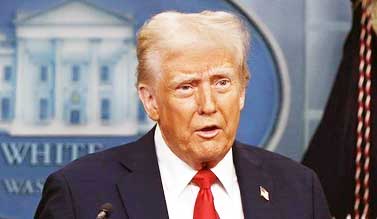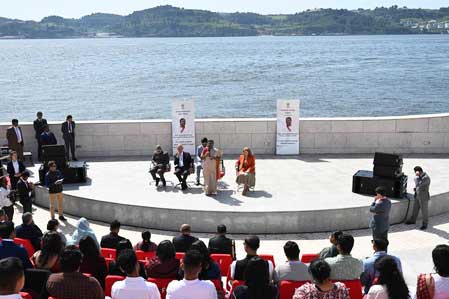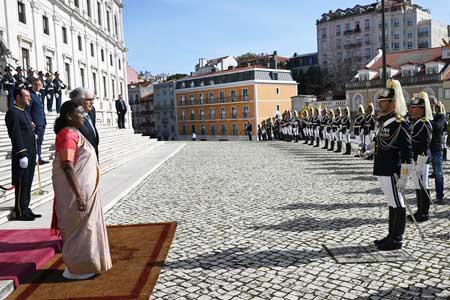Because of the importance of India’s pharmaceuticals to US healthcare, those exports will get a reprieve from President Donald Trump’s reciprocal tariffs, according to the White House.
The US is the largest importer of pharmaceuticals from India, bringing in products in the category worth $8.73 billion during the 2024 fiscal year, according to statistics cited by the India Brand Equity Foundation (IBEF).
IBEF said 31.5 per cent of India’s pharmaceutical exports went to the US.
The White House factsheet issued on Wednesday after Trump’s announcement of 26 per cent reciprocal tariffs on imports from India said that pharmaceuticals were exempt.
Indian drugs, especially the generics, help hold down the costs of the US healthcare system, which is already one of the most expensive in the world.
Previewing the likely outcomes of the tariffs, ING Bank had warned that “in the absence of a deal with India, we think Trump’s tariffs will mostly drive up drug prices for US consumers” because of the wide use of generics for which India is the major supplier.
Given the importance of Indian pharmaceuticals, President Trump has exempted that category even without a deal.
IQVIA, a healthcare data and analytics company, said that four out of ten prescriptions filled in the US in 2022 were from Indian companies.
“Out of the top 10 therapy areas by prescription volume, Indian companies supplied more than half of the prescriptions for five: hypertension, mental health, lipid regulators, nervous system disorders, and antiulcerants”, it said.
IQVIA estimated that by using generics from India, rather than high-priced branded products, the US healthcare system saved $219 billion in 2022 and a total of $1.3 trillion between 2013 and 2022.
These savings dwarf the dollar values of the pharmaceutical imports from India, and 26 per cent tariffs on them would have had a domino effect across the healthcare system, especially Medicare, the government healthcare insurance system for seniors, that is already facing challengee to long-rage viability.
The White House factsheet said that copper, semiconductors, lumber, bullion, energy and certain minerals that are not available in the US are also exempt from the reciprocal tariffs.






Trump lowers levies on countries like India for not retaliating
US President Donald Trump on Wednesday announced a lower rate of 10 per cent for 90 days in reciprocal tariffs for trading partner countries that have not retaliated with higher levies on American goods — such as India — and further hiked the levy on China to 125 per cent for hitting back.
HM Shah says Rana’s extradition a major diplomatic win for Modi govt
Union Home Minister Amit Shah has lauded the extradition of Tahawwur Hussain Rana, a key accused in the 26/11 Mumbai terror attacks, as a defining triumph for the administration of Prime Minister Narendra Modi.
Tripura govt committed to preserving old culture, tradition: CM Saha
Tripura Chief Minister Manik Saha on Wednesday said that the BJP government is working to preserve old culture and tradition like Putul Khela (doll game), Jatra (folk theatre) and Natak (drama).
Long arm of law eventually catches up with 26/11 plotter Tahawwur Rana
The proverbial long arm of the law has eventually caught up with Pakistani-Canadian businessman Tahawwur Hussain Rana, the co-conspirator of the 26/11 Mumbai terror attacks that killed 165 people and wounded over 300 in 2008.
No end in sight to Dhaka's growing rhetoric, India ends trans-shipment facility for Bangladesh
Citing "significant congestion" at its airports and ports, India on Tuesday said that it has terminated a trans-shipment facility available to Bangladesh that allowed Dhaka to export cargo to third countries using Indian customs stations.
5 terrorists trapped in two ongoing gunfights in J&K's Udhampur and Kishtwar
Five terrorists were reportedly trapped in two gunfights going on in Udhampur and Kishtwar districts of J&K on Wednesday, officials said.
Violence, atrocities against minorities in Bangladesh cannot simply be wished away: MEA
India on Wednesday once again raised concerns over the persecution of minorities in Bangladesh, hoping that the interim government in the country led by Chief Advisor Muhammad Yunus will take strong action against the perpetrators of violence.
NPCI to decide on person-to-merchant payments cap on UPI transactions: RBI
In order to further boost digital payments, the National Payments Corporation of India will be enabled to set the limit on person-to-merchants transactions via Unified Payments Interface (UPI), RBI Governor Sanjay Malhotra said on Wednesday.